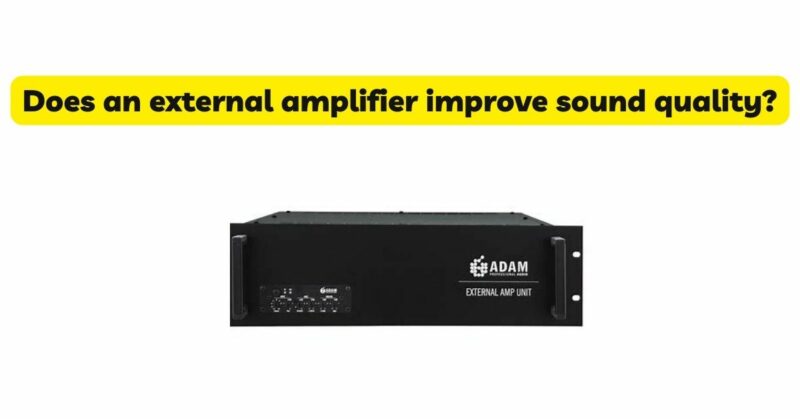When it comes to audio systems, the pursuit of exceptional sound quality is a common goal for enthusiasts and music lovers alike. One question that frequently arises is whether an external amplifier can significantly improve sound quality. In this article, we will delve into the role of external amplifiers and discuss their potential impact on sound quality in various audio setups.
Understanding the Role of an Amplifier: Before exploring the impact of external amplifiers on sound quality, it’s important to understand their fundamental role in an audio system. An amplifier serves as a bridge between audio sources, such as CD players or digital music players, and speakers. Its primary function is to increase the amplitude of the audio signals, providing the necessary power to drive speakers and faithfully reproduce sound.
Power and Control: One of the key advantages of using an external amplifier is the provision of ample power to the speakers. Amplifiers are designed to deliver sufficient electrical current to ensure that speakers can reproduce sound accurately and dynamically. By providing clean and robust power, an amplifier allows speakers to operate within their optimal range, minimizing distortion and maximizing fidelity. This enhanced power capability contributes to improved sound quality, especially in demanding audio passages or complex musical arrangements.
Additionally, external amplifiers often offer advanced control features that allow users to fine-tune the audio output. They may include options for adjusting gain, tone controls, equalization, and balance. These control features enable users to tailor the sound to their preferences and optimize the audio reproduction based on the characteristics of the room or the specific audio content being played.
Signal Integrity and Separation: Another significant aspect of sound quality that can be improved by an external amplifier is signal integrity and channel separation. A high-quality amplifier provides clean and accurate amplification, minimizing distortion and preserving the integrity of the audio signal throughout the amplification process. This results in improved clarity, detail, and accuracy in sound reproduction.
Furthermore, an external amplifier can enhance channel separation, particularly in multi-channel audio setups such as surround sound systems. Amplifiers with dedicated channels for each speaker ensure that the audio signals remain separate and distinct, preventing any interference or crosstalk between channels. This precise channel separation enhances the spatial imaging, localization, and overall immersive experience, especially in movies or music recordings that utilize discrete audio channels.
Dynamic Range and Transient Response: The dynamic range of audio refers to the difference between the softest and loudest sounds in a recording. An external amplifier with ample power reserves and low distortion capabilities can effectively reproduce the full dynamic range of audio content. This means that both subtle nuances and powerful peaks can be accurately rendered, allowing for a more engaging and lifelike listening experience.
Moreover, the transient response of an amplifier is crucial for faithfully reproducing the fast and transient changes in the audio signal, such as percussive sounds or sudden shifts in volume. A high-quality external amplifier with excellent transient response ensures that these rapid changes are accurately reproduced, resulting in more impactful and realistic sound reproduction.
Interconnectivity and Compatibility: External amplifiers often provide a wide range of input and output options, including analog and digital connections, ensuring compatibility with various audio sources and components. This interconnectivity allows for flexible integration with different audio devices, such as CD players, turntables, streaming devices, or home theater receivers. By incorporating an external amplifier into an audio system, users can optimize the signal path and ensure that the audio signals are preserved and amplified with the highest possible fidelity.
Conclusion: In conclusion, an external amplifier can indeed have a significant impact on sound quality in an audio system. The provision of ample power, advanced control features, improved signal integrity, channel separation, enhanced dynamic range, and transient response are all factors that contribute to an enhanced listening experience. While the extent of the improvement will depend on the specific components and overall system synergy, a high-quality external amplifier can elevate the sound quality to new heights, revealing the finer details, nuances, and dynamics in music and audio recordings. For audio enthusiasts seeking the ultimate sonic excellence, investing in a well-matched external amplifier is undoubtedly a worthwhile endeavor.


